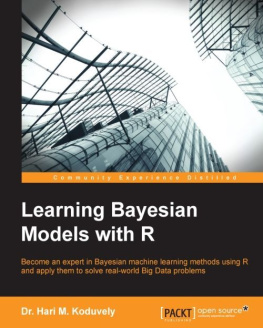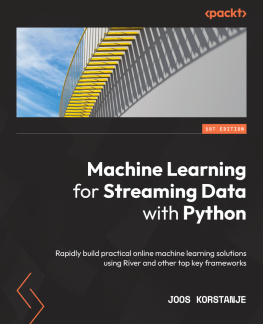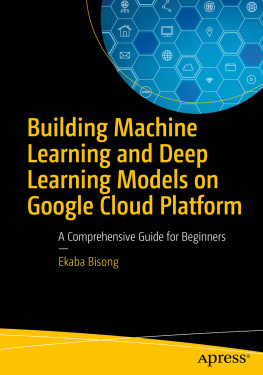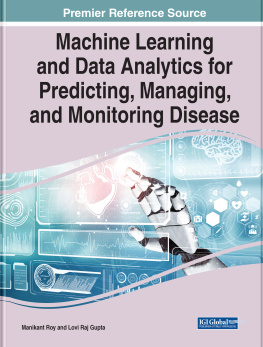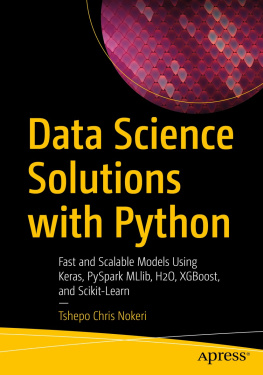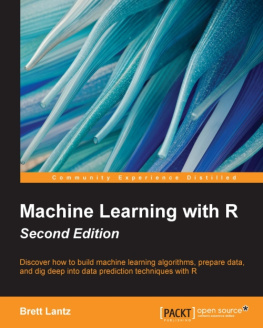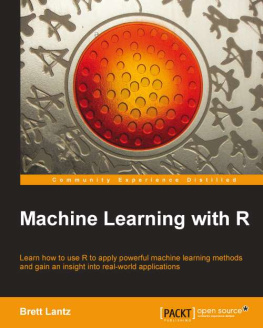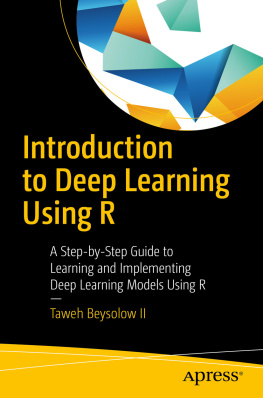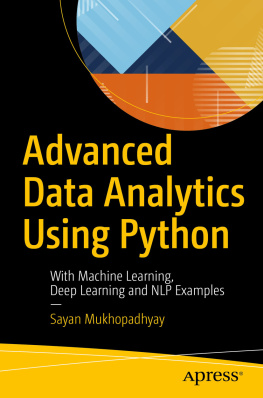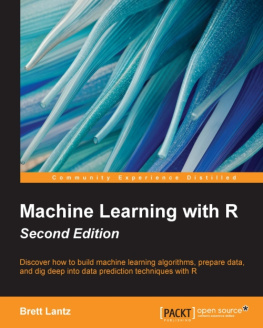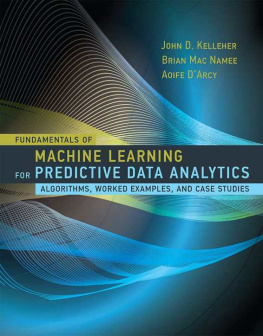Dr. Hari M. Koduvely - Learning Bayesian Models with R
Here you can read online Dr. Hari M. Koduvely - Learning Bayesian Models with R full text of the book (entire story) in english for free. Download pdf and epub, get meaning, cover and reviews about this ebook. year: 2015, publisher: Packt Publishing, genre: Computer. Description of the work, (preface) as well as reviews are available. Best literature library LitArk.com created for fans of good reading and offers a wide selection of genres:
Romance novel
Science fiction
Adventure
Detective
Science
History
Home and family
Prose
Art
Politics
Computer
Non-fiction
Religion
Business
Children
Humor
Choose a favorite category and find really read worthwhile books. Enjoy immersion in the world of imagination, feel the emotions of the characters or learn something new for yourself, make an fascinating discovery.
- Book:Learning Bayesian Models with R
- Author:
- Publisher:Packt Publishing
- Genre:
- Year:2015
- Rating:3 / 5
- Favourites:Add to favourites
- Your mark:
Learning Bayesian Models with R: summary, description and annotation
We offer to read an annotation, description, summary or preface (depends on what the author of the book "Learning Bayesian Models with R" wrote himself). If you haven't found the necessary information about the book — write in the comments, we will try to find it.
Become an expert in Bayesian Machine Learning methods using R and apply them to solve real-world big data problems
About This Book- Understand the principles of Bayesian Inference with less mathematical equations
- Learn state-of-the art Machine Learning methods
- Familiarize yourself with the recent advances in Deep Learning and Big Data frameworks with this step-by-step guide
This book is for statisticians, analysts, and data scientists who want to build a Bayes-based system with R and implement it in their day-to-day models and projects. It is mainly intended for Data Scientists and Software Engineers who are involved in the development of Advanced Analytics applications. To understand this book, it would be useful if you have basic knowledge of probability theory and analytics and some familiarity with the programming language R.
What You Will Learn- Set up the R environment
- Create a classification model to predict and explore discrete variables
- Get acquainted with Probability Theory to analyze random events
- Build Linear Regression models
- Use Bayesian networks to infer the probability distribution of decision variables in a problem
- Model a problem using Bayesian Linear Regression approach with the R package BLR
- Use Bayesian Logistic Regression model to classify numerical data
- Perform Bayesian Inference on massively large data sets using the MapReduce programs in R and Cloud computing
Bayesian Inference provides a unified framework to deal with all sorts of uncertainties when learning patterns form data using machine learning models and use it for predicting future observations. However, learning and implementing Bayesian models is not easy for data science practitioners due to the level of mathematical treatment involved. Also, applying Bayesian methods to real-world problems requires high computational resources. With the recent advances in computation and several open sources packages available in R, Bayesian modeling has become more feasible to use for practical applications today. Therefore, it would be advantageous for all data scientists and engineers to understand Bayesian methods and apply them in their projects to achieve better results.
Learning Bayesian Models with R starts by giving you a comprehensive coverage of the Bayesian Machine Learning models and the R packages that implement them. It begins with an introduction to the fundamentals of probability theory and R programming for those who are new to the subject. Then the book covers some of the important machine learning methods, both supervised and unsupervised learning, implemented using Bayesian Inference and R.
Every chapter begins with a theoretical description of the method explained in a very simple manner. Then, relevant R packages are discussed and some illustrations using data sets from the UCI Machine Learning repository are given. Each chapter ends with some simple exercises for you to get hands-on experience of the concepts and R packages discussed in the chapter.
The last chapters are devoted to the latest development in the field, specifically Deep Learning, which uses a class of Neural Network models that are currently at the frontier of Artificial Intelligence. The book concludes with the application of Bayesian methods on Big Data using the Hadoop and Spark frameworks.
Style and approachThe book first gives you a theoretical description of the Bayesian models in simple language, followed by details of its implementation in the R package. Each chapter has illustrations for the use of Bayesian model and the corresponding R package, using data sets from the UCI Machine Learning repository. Each chapter also contains sufficient exercises for you to get more hands-on practice.
Dr. Hari M. Koduvely: author's other books
Who wrote Learning Bayesian Models with R? Find out the surname, the name of the author of the book and a list of all author's works by series.

